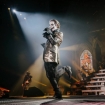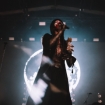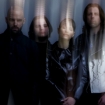Order Revolver's Ghost special collector's issue and exclusive colored vinyl variants of the band's five albums at our shop.
By the time Ghost released their fourth studio album Prequelle in 2018, the Swedish occult rockers had grown from a mysterious cult-favorite club act led by a bizarre evil Pope and his band of anonymous Nameless Ghouls — to a (still mysterious) stadium-filling, award-winning force that commanded a worldwide fanbase and earned praise from metal greats including Phil Anselmo, Dave Grohl, the members of Metallica and more.
The record, which would go on to earn them a Grammy nomination for Best Rock Album, presented Ghost at their most dramatic as they led listeners on a journey through rousing anthems ("Rats"), grooving, poppy earworms ("Dance Macabre"), massive ballads ("Pro Memoria") catchy instrumentals ("Helvetesfönster," "Miasma") and more.
Prequelle also marked a pretty intense turning point for the band: both in terms of its characters' mythology (namely, the emergence of new leader Cardinal Copia) and the men behind the masks. After years of secrecy, Ghost's longtime mastermind was revealed to be Tobias Forge of Swedish death-metal crew Repugnant. Forge's new willingness to conduct out-of-character interviews provided some interesting, previously hidden, insights into Prequelle's vision and the inner workings of Ghost.
Below are 10 things you may not know about Prequelle, from murdered Papas and Opeth assists to nearly scrapped disco riffs, Kill Em All–inspired solos and more.
1. Cardinal Copia appears … and the prior Papas get murdered
Since Ghost first appeared on the scene in 2006 the Swedish band was masked in mystery. Quite literally, its players were an anonymous band of masked-wearing musicians each dubbed "Nameless Ghoul." The obvious exception was Ghost's striking frontman … or frontmen.
For each of Ghost's previous albums — Opus Eponymous (2010), Infestissumam (2013) and Meliora (2015) — the ghastly outfit was led by a successive string of Satanic popes: Papa Emeritus I, II and III. Prequelle introduced a new leader: Cardinal Copia — a lothario character aiming to "earn his skull paint" and ascend to his own papal status. Upon the arrival of Copia, the previous Papas — all except Papa Zero — met their untimely demise.
"The Cardinal is not the boss. He's just the toastmaster," Forge revealed. "A cardinal is junior to a pope figure. We still have Papa Emeritus [Zero, a.k.a. Papa Nihil] but he's passing on. He needs to teach the Cardinal to become a pope, to earn his skull paint."
2. Ghost mastermind Tobias Forge gets unmasked … and does "a little bit of remodeling"
Copia wasn't the only new figure to attract the spotlight around Prequelle. During this era, Ghost's longtime mastermind Tobias Forge stepped out from behind the mask. For the first seven years of the Swedish band's existence Forge wasn't just the founder and primary songwriter, he was also the singer behind the Papa masks. He actively avoided the spotlight and instead used Ghost to further the mythology of Ghost. He had no desire to become the face of Ghost, but his hand was forced when some former Nameless Ghouls filed a lawsuit (to recoup alleged money they claim they were owed) — which contained his real name on the legal documents.
"Once the spotlight is cast on you, you can either step out of it and hope it won't follow you, or you have to speak," Forge told Revolver. "But you have to do something because people are watching. And I definitely know that I'm too far from the shore that I started off from to not realize the severity of the situation. I felt like if this is as good as I think it is and what I've made people believe — and what people in turn have made me believe that it is, it should stand for a little bit of remodeling."
The "remodeling" commenced for Prequelle, and featured the aforementioned Cardinal Copia, a new cast of Nameless Ghouls.
3. Forge birthed Cardinal Copia, but he didn't like him very much.
Cardinal Copia was, truly, a shit-heel character … and his creator knew it. Forge always planned on a succession of Papas, before "a moment in time where you have to sort of chew through a little bit of an underdog person that you might not like," he said. "So we end up with this character that I'm not even fond of myself. He's new and he is an imposter and he hasn't proven himself yet. But if he does, he will become Papa IV."
4. Prequelle is about "the return of god."
Cardinal Copia's youthful exuberance, naivety and irreverence was the perfect vehicle to carry Prequelle's grim concept, which incorporates divine retribution, a plague-ridden doomsday scenario and the predictable human morality struggle between hope and nihilism that follows in its wake.
"The return of god" he told Guitar World when asked to summarize Prequelle's concept. "And, for lack of a better way to put it, the day of doom, when god's hand sort of reaches down upon the people. Like the Black Death. I wanted this album to have a sort of doomsday theme. But then it's also themed around the idea of mortality and survival through turmoil, where you're being judged and a doom has been cast upon you. How do you maneuver out of that?"
5. Prequelle's "Rats" are us
The album's infectious single "Rats" is a fucking exultant jam — that's also an examination of humanity's enduring barbaric nature. Yes, the rats are us — at least the worst aspects of our nature that thrives on social media.
"For many, many years in modern life we prided ourselves on greater morals and being smarter than we were in the Middle Ages… But I think that online mannerisms are very close to open-square stonings many hundreds of years ago when people were fucking barbarians," Forge told Revolver. "Before the internet and before social media, if you were a kid who was bullied, at least you had the luxury of being able to shut the door and leave the bullies outside. It was something that took place in the confines of school or [on] the way home from school. If you were spoken of in negative terms, it might not reach you, whereas now you cannot hide. You're constantly in the spotlight, open to anyone's spite. And I don't think that that's necessarily a good power to hand over to man. … Rats are a disease-spreading enemy in great numbers that come from all over, that surround you. Rats come from the sewer. They can come up from your toilet. They can come up through your sink. They're in your walls, if you're unlucky."
6. Writing lyrics is like "pulling teeth" for Forge
Forge is clearly pretty well adept as turning a phrase, and then weaving those phrases into elaborate conceptual works of art. But it turns out writing lyrics is one of the most painful parts of his creative process.
"The music comes first," Forge told Guitar World. "Final lyrics are usually written very close to recording the vocals. It's always been like a pulling-teeth situation for me, where some songs are definitely a knife to the throat on the day of singing. Like, 'I need a lyric to this…now!'
"There are things like that every time," he continued. "It's endless. Because I always want to change things. … Like with the song 'Rats,' I knew that was going to be the title and there was going to be the part that goes [sings riff] 'Rrrats!' And from that it went through a lot of different shapes. … It's varying degrees of pain."
7. Forge is a multi-instrumentalist … but he didn't play that epic sax solo on "Miasma"
Forge is not only Ghost's primary songwriter, he's also a multi-instrumentalist that's often tracked multiple parts on the band's records. For the synth-heavy jam, "Miasma," he even hummed the standout saxophone solo.
"At some point or another I've played everything," he told Guitar World. "I'm an able drummer, I can play Top 40 rock okay, but I can't record hard-rock drums in a studio situation. That would be a waste of time. So I had a real drummer come in to do that work, even though I wrote the drum patterns. And that goes for all the records and all the songs. Even the songs that were co-written, I always played all the instruments at one point. So, when you hear Ghost, it's my drum style. It's my bass style. It's my keyboard style. It's my guitar style. … But … I can't play saxophone. But I can hum how I want a saxophone solo to be played."
8. Forge got a guitar assist on Prequelle from Opeth's Mikael Åkerfeldt
Forge performed all guitars on Prequelle — except one troublesome nylon-string section in "Helvetesfönster" that required some help from Forge's friend and Opeth mainman Mikael Åkerfeldt.
"I performed all the guitars and all the bass," Forge said of Prequelle. "With one exception — in the song 'Helvetesfönster,' there was a nylon-string part. I originally recorded it with electric guitar but it sounded weak. It didn't sound cool. So I wanted it to be played with a nylon string. Now, I stopped playing nylon string when I was seven years old, so I called a friend of mine, Mikael Åkerfeldt from Opeth, who is very good at playing nylon string, to do it."
9. Forge almost scrapped the disco-metal riff that became "Dance Macabre"
"Dance Macabre" is a tasty slice of pop-infused end-times metal. But the track almost got put aside because Forge initially thought its main riff was too "synth-y." Thankfully, he got a second opinion before chucking it.
"I had the riff that starts the whole song, that was just a riff that got stuck in my head," he said. "I didn't think of it as a Ghost thing at first. Because I heard the riff in a slightly more 'synth-y' sort of way. But I showed it to some songwriting pals of mine and they were like, 'That's a Ghost song!' Oh, okay. I didn't hear it that way at first. But it then it was, 'Let's make a Ghost song out of it…'"
10. Forge's shreddy guitar solos on "Faith" were inspired by Metallica's "Hit the Lights"
When it comes to guitar techniques, Forge says he'd "definitely lose" in a "cock-measuring contest where it's about playing licks and playing fast techniques of others." But, the dude can definitely throw down when needed. For his aggro lead break in "Faith," he took a page from the book of his heroes in Metallica.
"I've never considered myself a traditionally good fast-playing guitarist," he revealed to Guitar World. "But I can do it, especially when I'm recording. With 'Faith,' the solo called for an intense, aggressive part where I was like, 'This needs to be aaargh!' I wanted to have that sort of attack you hear when you listen to something like [Metallica's] "Hit the Lights," where after every drum thing there's this insane, quick, aggressive guitar bit. I wanted a piece like that but that sounded more evil. And I was able to do it."








